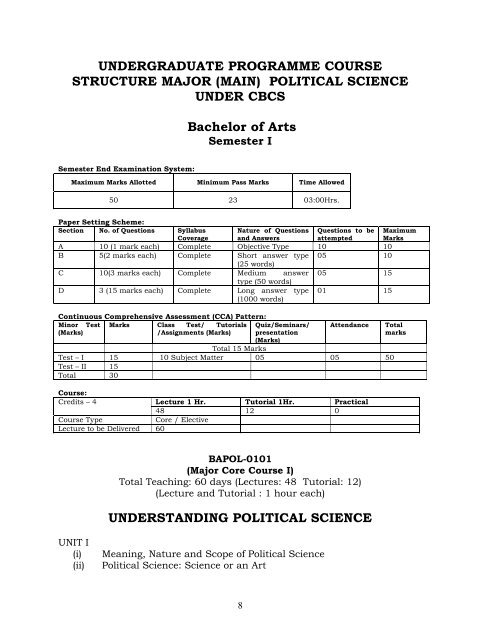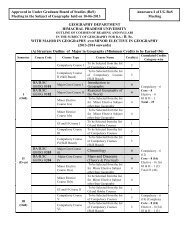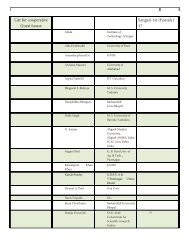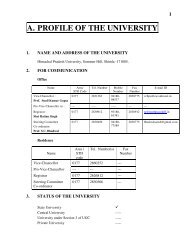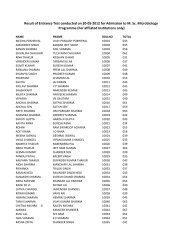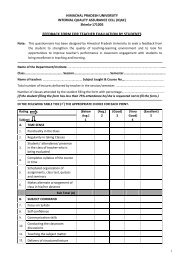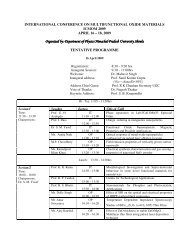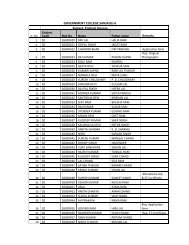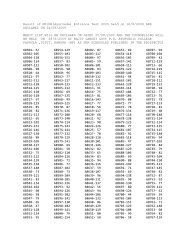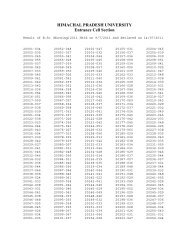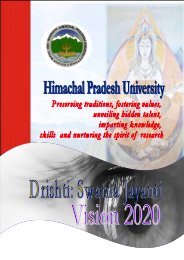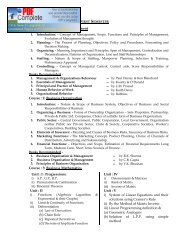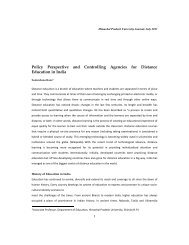Detailed Syllabus- Outline, End Term Exam Guidelines, Structure, etc.
Detailed Syllabus- Outline, End Term Exam Guidelines, Structure, etc.
Detailed Syllabus- Outline, End Term Exam Guidelines, Structure, etc.
Create successful ePaper yourself
Turn your PDF publications into a flip-book with our unique Google optimized e-Paper software.
UNDERGRADUATE PROGRAMME COURSESTRUCTURE MAJOR (MAIN) POLITICAL SCIENCEUNDER CBCSBachelor of ArtsSemester ISemester <strong>End</strong> <strong>Exam</strong>ination System:Maximum Marks Allotted Minimum Pass Marks Time Allowed50 23 03:00Hrs.Paper Setting Scheme:Section No. of Questions <strong>Syllabus</strong>CoverageNature of Questionsand AnswersQuestions to beattemptedA 10 (1 mark each) Complete Objective Type 10 10B 5(2 marks each) Complete Short answer type 05 10(25 words)C 10(3 marks each) Complete Medium answer 05 15type (50 words)D 3 (15 marks each) Complete Long answer type 01 15(1000 words)MaximumMarksContinuous Comprehensive Assessment (CCA) Pattern:Minor Test Marks Class Test/ Tutorials Quiz/Seminars/ Attendance Total(Marks)/Assignments (Marks) presentationmarks(Marks)Total 15 MarksTest – I 15 10 Subject Matter 05 05 50Test – II 15Total 30Course:Credits – 4 Lecture 1 Hr. Tutorial 1Hr. Practical48 12 0Course TypeCore / ElectiveLecture to be Delivered 60BAPOL-0101(Major Core Course I)Total Teaching: 60 days (Lectures: 48 Tutorial: 12)(Lecture and Tutorial : 1 hour each)UNDERSTANDING POLITICAL SCIENCEUNIT I(i)(ii)Meaning, Nature and Scope of Political SciencePolitical Science: Science or an Art8
(iii)(iv)UNIT II(i)(ii)(iii)UNIT III(i)(ii)(iii)UNIT IV(i)(ii)(iii)Relationship of Political Science with History, Economics andSociologyRelationship with Political Theory and Political PhilosophySTATEElements of StateDifference between State and Government, State and Society, Stateand AssociationSovereignty: Features, Kinds, Monistic and Pluralistic TheoryTHEORIES OF ORIGIN OF STATESocial Contract TheoryHistorical TheoryMarxist TheoryFUNCTIONS OF STATELiberal Theory of Functions of StateWelfare Theory of Functions of StateMarxist Theory of Functions of StateEssential/Selected Readings:Sushila Ramaswamy, Political Theory: Ideas and Concepts. New Delhi:Macmillan India, 2004.Adi H. Doctor, Issues in Political Theory. New Delhi: Sterling Publishers,1985.R.M. MacIver. The Modern State. Oxford: Oxford University Press, 1926.A.P.D. Entreves, the Notion of the State Oxford: Clarendon Press, 1967.M.P. Jain, Political Theory: Liberal and Marxian Delhi: Authors GuildPublications, 1979.A.C. Kapur, Principles of Political Science. New Delhi: S. Chand andCompany, 1981.9
Semester <strong>End</strong> <strong>Exam</strong>ination System:Maximum Marks Allotted Minimum Pass Marks Time Allowed50 23 03:00Hrs.Paper Setting Scheme:Section No. of Questions <strong>Syllabus</strong>CoverageNature of Questionsand AnswersQuestions to beattemptedA 10 (1 mark each) Complete Objective Type 10 10B 5(2 marks each) Complete Short answer type 05 10(25 words)C 10(3 marks each) Complete Medium answer 05 15type (50 words)D 3 (15 marks each) Complete Long answer type 01 15(1000 words)MaximumMarksContinuous Comprehensive Assessment (CCA) Pattern:Minor Test Marks Class Test/ Tutorials Quiz/Seminars/ Attendance Total(Marks)/Assignments (Marks) presentationmarks(Marks)Total 15 MarksTest – I 15 10 Subject Matter 05 05 50Test – II 15Total 30Course:Credits – 4 Lecture 1 Hr. Tutorial 1Hr. Practical48 12 0Course TypeCore / ElectiveLecture to be Delivered 60Bachelor of ArtsSemester IBAPOL--0102(Major Core Course II)Total Teaching: 60 days (Lectures: 48 Tutorial: 12)(Lecture and Tutorial : 1 hour each)UNIT ICOLONIALISM IN INDIA AND CONSTITUTIONALDEMOCRACY(i)(ii)(iii)(iv)Foundations of Colonial Rule in IndiaNature of Colonial Rule in IndiaImpact of Colonial Rule in IndiaCauses of nationalism in India10
(v)UNIT II(i)(ii)(iii)(iv)UNIT III(i)(ii)(iii)UNIT IV(i)(ii)(iii)(iv)Phases of Indian National MovementLegacies of Indian Political System: Legacy of Ancient India,Muslim Rule, British Rule and National MovementFormation and Socio-economic composition of the ConstituentAssemblyThe Philosophy of the Indian ConstitutionFeatures of the Indian ConstitutionFundamental Rights and DutiesDirective Principles of State PolicyAmendment procedure of Indian ConstitutionFederal and Unitary Features of the Indian ConstitutionCentre-State RelationsQuestion of State AutonomyThree tier system of Government : Panchayati Raj, Urban LocalBodiesEssential/Selected Readings:S. Bandopadhyay, from Plassey to Partition: A History of Modern India, NewDelhi, Orient Longman, 2004.M<strong>etc</strong>alf and M<strong>etc</strong>alf, A Concise History of India, Cambridge: CambridgeUniversity Press, 2002.S. Sarkar, Modern India 1885-1947, New Delhi: Macmillan 1983.B. Chandra, Essays on Colonialism Hyderabad Orient Longman Ltd. 1999.P.R. Desouza ed., Contemporary India: Transitions, New Delhi: Sage 2000.A.D. Smith, Nationalism, Cambridge: Polity Press 2001.A.S. Narang, Government and Politics in India.C.P. Bhambari, Politics in India : 1947-1977D.C. Gupta, Indian Government and PoliticsM.P. Jain, Indian Government and PoliticsG. Austin, The Indian Constitution: Cornerstone of a Nation, New Delhi,Oxford University Press 1979.K.R. Bomball, Indian Constitution and Administration, Ambala: ModernPublications 1970.11
Semester <strong>End</strong> <strong>Exam</strong>ination System:Maximum Marks Allotted Minimum Pass Marks Time Allowed50 23 03:00Hrs.Paper Setting Scheme:Section No. of Questions <strong>Syllabus</strong>CoverageNature of Questionsand AnswersQuestions to beattemptedA 10 (1 mark each) Complete Objective Type 10 10B 5(2 marks each) Complete Short answer type 05 10(25 words)C 10(3 marks each) Complete Medium answer 05 15type (50 words)D 3 (15 marks each) Complete Long answer type 01 15(1000 words)MaximumMarksContinuous Comprehensive Assessment (CCA) Pattern:Minor Test Marks Class Test/ Tutorials Quiz/Seminars/ Attendance Total(Marks)/Assignments (Marks) presentationmarks(Marks)Total 15 MarksTest – I 15 10 Subject Matter 05 05 50Test – II 15Total 30Course:Credits – 4 Lecture 1 Hr. Tutorial 1Hr. Practical48 12 0Course TypeCore / ElectiveLecture to be Delivered 60Bachelor of ArtsSemester IIBAPOL--0203(Major Core Course III)Total Teaching: 60 days (Lectures: 48 Tutorial: 12)(Lecture and Tutorial : 1 hour each)INTRODUCTION TO COMPARATIVE GOVERNMENT ANDPOLITICSUNIT I(i)(ii)(iii)Meaning, Nature and Scope of Comparative PoliticsImportance, Objectives and UtilityComparative Methods, Its Nature and ProblemsUNIT II(i)System Approach (David Easton)12
(ii)(iii)UNIT III(i)(ii)(iii)Structural-Functional ApproachInstitutional ApproachParliamentary Forms of GovernmentPresidential Forms of GovernmentUnitary and Federal Forms of GovernmentUNIT IV(i)(ii)(iii)(iv)TYPOLOGY OF POLITICAL SYSTEMLiberalDemocraticAuthoritarianTotalitarianEssential/Selected Readings:A.H. Birch, The British System of Government, London: George Allen, 1970.C. Wright Mills, Power Elites New York, Oxford University Press,1957.G.A. Almond and B. Powell, Comparative Politics: A DevelopmentalApproach, Boston: Little Brown 1966.Eckstein and D. Apter, Comparative Politics, A Reader, New York: Free Press1963.Jean Blondel, Comparative Politics, New York Free Press, 1963.Lester W. Milbrachard, M.L. Goel, Political Participation, Chicago: RandMenally College Pub. Co.,1971.Mehran Kamrava, Understanding Comparative Politics: A Framework forAnalysis London: 1996.R.C. Macridis, The Study of Comparative Government, Garden CityDoubleday, 1955.Robert A. Dhal, Who Governs ? New Haven: Yale University Press 1961.Samansen and Ashish Bhandari, Advance Readings in ComparativeGovernment and Politics, New Delhi, Sandarbh, 1998.T.B. Bottomore, Elities and Societies, Penguin, 1971.Vidya Bhushan, Comparative Politics, New Delhi, Atlantic Pub., 1997.13
Semester <strong>End</strong> <strong>Exam</strong>ination System:Maximum Marks Allotted Minimum Pass Marks Time Allowed50 23 03:00Hrs.Paper Setting Scheme:Section No. of Questions <strong>Syllabus</strong>CoverageNature of Questionsand AnswersQuestions to beattemptedA 10 (1 mark each) Complete Objective Type 10 10B 5(2 marks each) Complete Short answer type 05 10(25 words)C 10(3 marks each) Complete Medium answer 05 15type (50 words)D 3 (15 marks each) Complete Long answer type 01 15(1000 words)MaximumMarksContinuous Comprehensive Assessment (CCA) Pattern:Minor Test Marks Class Test/ Tutorials Quiz/Seminars/ Attendance Total(Marks)/Assignments (Marks) presentationmarks(Marks)Total 15 MarksTest – I 15 10 Subject Matter 05 05 50Test – II 15Total 30Course:Credits – 4 Lecture 1 Hr. Tutorial 1Hr. Practical48 12 0Course TypeCore / ElectiveLecture to be Delivered 60Bachelor of ArtsSemester IIBAPOL--0204(Major Core Course IV)Total Teaching: 60 days (Lectures: 48 Tutorial: 12)(Lecture and Tutorial : 1 hour each)GOVERNMENT IN INDIA AND ITS FUNCTIONINGUNIT ILEGISLATUREComposition, Powers and Position of Lok Sabha and Rajya SabhaSpeaker of Lok SabhaLegislative Processes in ParliamentWorking of Parliament14
UNIT IIUNION EXECUTIVEPresident of India: Election, Powers and PositionCabinet form of GovernmentPrime Minister: Appointment, Powers and PositionUNIT IIIJUDICIARYFeatures of Judicial System in IndiaComposition, Powers and Position of Supreme CourtJudicial Review, Judicial Activism and Lok AdalatUNIT IVFinance CommissionPlanning CommissionNational Development CouncilEssential/Selected Readings:D. Kapur and P.B. Mehta (ed.), Public Institution in India, Performance andDesign, New Delhi: Oxford University Press, 2005.B.L. Shankar and V. Rodriguez, The Indian Parliament: A Democracy atWork, New Delhi: Oxford University Press, 2011.A. Austin, Working a Democratic Constitution, New Delhi: Oxford UniversityPress, 2000.A.K. Mehra and G.W. Kueck (eds.), The Indian Parliament: A ComparativePerspective, New Delhi: Konark Publishers, 2003.L.I. Rudolph and S.H. Rudolph, Explaining Indian Democracy: A Fifty YearPerspective 1956-2006, New Delhi: Oxford University Press, 2008.B. Arora and D. Verney (eds.), Multiple Identities in a Single State: IndianFederalism in Comparative Perspective, Delhi: Konark 1995.K. Le Roy, C. Saunders and J. Kincaid (eds.), A Global Dialogue onFederalism, Montreal: Queen’s University Press, 2006.W.H. Morris. Jones, Government and Politics in India, London: Unwin 1971.Norman D. Palmer, Indian Political Systems London, George Allan andUnwin, 1963.15
Semester <strong>End</strong> <strong>Exam</strong>ination System:Maximum Marks Allotted Minimum Pass Marks Time Allowed50 23 03:00Hrs.Paper Setting Scheme:Section No. of Questions <strong>Syllabus</strong>CoverageNature of Questionsand AnswersQuestions to beattemptedA 10 (1 mark each) Complete Objective Type 10 10B 5(2 marks each) Complete Short answer type 05 10(25 words)C 10(3 marks each) Complete Medium answer 05 15type (50 words)D 3 (15 marks each) Complete Long answer type 01 15(1000 words)MaximumMarksContinuous Comprehensive Assessment (CCA) Pattern:Minor Test Marks Class Test/ Tutorials Quiz/Seminars/ Attendance Total(Marks)/Assignments (Marks) presentationmarks(Marks)Total 15 MarksTest – I 15 10 Subject Matter 05 05 50Test – II 15Total 30Course:Credits – 4 Lecture 1 Hr. Tutorial 1Hr. Practical48 12 0Course TypeCore / ElectiveLecture to be Delivered 60Bachelor of ArtsSemester IIIBAPOL-0305(Major Core Course V)Total Teaching: 60 days (Lectures: 48 Tutorial: 12)(Lecture and Tutorial : 1 hour each)UNIT IINTRODUCTION TO INTERNATIONAL POLITICS(i)(ii)(iii)Meaning, Nature and Scope of International PoliticsRelevance and Importance of International PoliticsImperialism and Colonialism: Modern TrendsUNIT II16
(i)(ii)(iii)Realist Approach to the Study of International PoliticsIdealist Approach to the Study of International PoliticsGame TheoryUNIT III(i)(ii)(iii)National Power: Elements and LimitationsNational InterestBalance of Power (Meaning, Devices and Contemporary Relevance)UNIT IV(i)(ii)(iii)Collective Security: Meaning and SafeguardsPacific Settlement of International Disputes, Devices under U.N.CharterDisarmament and Arms Control, Obstacles to NuclearDisarmamentEssential/Selected Readings:Banerjee, A. Marxist Theory and Third World. New Delhi: Sage, 1984.Beitz, C.A. Political Theory and International Relations. New York: ColumbiaUniversity Press, 1977.Bull H., The Anarchical Society: A Study of Order in International Politics.New York: Columbia University Press, 1977.Burton, J.W. International Relations: A General Theory. Bombay: Allen andUnwin, 1971.Dougherty, J.E. and Pfaltzgraff, Jr., R.L. Contending Theories ofInternational Relations. New York: Philadelphia, 1971.Deutsch, K. The Analysis of International Relations. Eaglewood Cliffs:Prentice Hall, 1968.Holsti, K. International Politics: Framework for Analysis. Eaglewood Cliffs:Prentice Hall, 1983.Kaplan, Mortan. System and Processes in International Politics. New Yhork:Wiley and Sons, 1962.Kegly and Wittkopf. World Politics: Trends and Transformation, New York:St. Martin Press, 1985.Lieber, R.J. Theory and World Politics. London, Allen and Unwin, 1972.Mishra, K.P. and Blum, R., eds. Approaches to International Politics, NewDelhi: J.N.U., 1981.Morganthau, H. Politics Among Nations. Calcutta, Scientific New Agency,1969.Morganthau, H. and Thompson, K. Politics Among Nations. Struggle forPower and Peace. New Delhi: Kalyani Press, 1985.17
Rosenau, James N. (ed. International Politics and Foreign Policy: A Readerin Research and Theory. New York: The Free Press of Glencoe, 1961.Tomashevley, D. Lenin’s Ideas and Modern International Relations. Moscow:Progress Publication, 1974.Wright, Q. The Study of International Relation. New York: Appleton-CenturyCrofts, 1955.Semester <strong>End</strong> <strong>Exam</strong>ination System:Maximum Marks Allotted Minimum Pass Marks Time Allowed50 23 03:00Hrs.Paper Setting Scheme:Section No. of Questions <strong>Syllabus</strong>CoverageNature of Questionsand AnswersQuestions to beattemptedA 10 (1 mark each) Complete Objective Type 10 10B 5(2 marks each) Complete Short answer type 05 10(25 words)C 10(3 marks each) Complete Medium answer 05 15type (50 words)D 3 (15 marks each) Complete Long answer type 01 15(1000 words)MaximumMarksContinuous Comprehensive Assessment (CCA) Pattern:Minor Test Marks Class Test/ Tutorials Quiz/Seminars/ Attendance Total(Marks)/Assignments (Marks) presentationmarks(Marks)Total 15 MarksTest – I 15 10 Subject Matter 05 05 50Test – II 15Total 30Course:Credits – 4 Lecture 1 Hr. Tutorial 1Hr. Practical48 12 0Course TypeCore / ElectiveLecture to be Delivered 60UNIT IBachelor of ArtsSemester IIIBAPOL--0306(Major Core Course VI)Total Teaching: 60 days (Lectures: 48 Tutorial: 12)(Lecture and Tutorial : 1 hour each)POLITICAL THEORY: BASIC CONCEPTS18
Rights: Meaning, Features and KindsTheories of RightsLaski’s Theory and Marxist TheoryConcept of Property and its CharacteristicsLaski’s Theory of PropertyMarxist Theory of PropertyUNIT IILiberty: Meaning and CharacteristicsAspects of Liberty: Negative and PositiveDimensions of Liberty: Social, Political and EconomicEquality: Meaning and CharacteristicsAspects of Equality : Negative and PositiveDimensions of Equality: Social, Political and EconomicRelationship between Liberty and EqualityUNIT IIIJustice: Meaning and Basic Postulates of JusticeDimensions of JusticeMeaning, Kinds and Source of LawJustice: Relationship with Liberty and EqualityUNIT IV(i)(ii)(iii)PowerAuthorityLegitimacyEssential/Selected Readings:Adi H. Doctor. Issues in Political Theory. New Delhi: Sterling Publishers,1985.Sushila Ramaswamy. Political Theory: Ideas and Concepts. New Delhi:Macmillan India, 2004.M.P. Jain, Political Theory: Liberal and Marxian. Delhi: Authors GuildPublications, 1993.S.I. Benn & R.S. Peters. Social Principles and the Democratic State. London:George and Allen, 1959.Issaiah Berlin, Four Essays on Liberty. Oxford: Oxford University Press,1969.D.D. Raphael, Problems of Political Philosophy. London: Macmillan, 1990.H.J. Laski, A Grammar of Politics. Delhi: S Chand, 1979.19
Semester <strong>End</strong> <strong>Exam</strong>ination System:Maximum Marks Allotted Minimum Pass Marks Time Allowed50 23 03:00Hrs.Paper Setting Scheme:Section No. of Questions <strong>Syllabus</strong>CoverageNature of Questionsand AnswersQuestions to beattemptedA 10 (1 mark each) Complete Objective Type 10 10B 5(2 marks each) Complete Short answer type 05 10(25 words)C 10(3 marks each) Complete Medium answer 05 15type (50 words)D 3 (15 marks each) Complete Long answer type 01 15(1000 words)MaximumMarksContinuous Comprehensive Assessment (CCA) Pattern:Minor Test Marks Class Test/ Tutorials Quiz/Seminars/ Attendance Total(Marks)/Assignments (Marks) presentationmarks(Marks)Total 15 MarksTest – I 15 10 Subject Matter 05 05 50Test – II 15Total 30Course:Credits – 4 Lecture 1 Hr. Tutorial 1Hr. Practical48 12 0Course TypeCore / ElectiveLecture to be Delivered 60Bachelor of ArtsSemester IVBAPOL-0407(Major Core Course VII)Total Teaching: 60 days (Lectures: 48 Tutorial: 12)(Lecture and Tutorial : 1 hour each)POLITICAL IDEOLOGIESUNIT ILIBERALISMMeaning and Characteristics of LiberalismDevelopment of Liberalism : Negative and PositiveUNIT IITHEORIES OF DEMOCRACY20
Classical Liberal Theory of DemocracyElite Theory of DemocracyPluralist Theory of DemocracyMarxist Theory of DemocracyUNIT IIIMARXISMMarxian Interpretation of HistoryMarxian Theory of Social and Political ChangeTheory of RevolutionUNIT IVSOCIALISM AND FASCISMSocialism: Meaning, Features and DevelopmentFascism: Meaning, Features and DevelopmentSuggested Readings:M.P. Jain, Political Theory: Liberal and Marxian (Delhi: Authors GuildPublications, 1993).F.W. Coker, Recent Political Thought (Calcutta: The Words Press, 1966).W. Ebenstein, Great Political Thinkers (New Delhi: Oxford and IBH, 1974).J.A. Schumpeter, Capitalism, Socialism and Democracy (London: GeorgeAllen & Unwin, 1976).C.B. Macpherson, The Life and Times of Liberal Democracy, Oxford: OxfordUniversity Press, 1977.G. Sartori, Democratic Theory (New Delhi: Oxford and IBH, 1965).Shibdas Ghosh, On Fascism (Calcutta: SUCI, 1975).Ruggiero, “Liberalism” in E.R.A. Seligman ed., Encyclopedia of the SocialSciences, Vol. IV (NV., 1937).M. Freeden, The New Liberalism: An Ideology of Social Reform (London:OUP, 1978).D. Held, Models of Democracy (Cambridge: Polity Press, 1987).21
Semester <strong>End</strong> <strong>Exam</strong>ination System:Maximum Marks Allotted Minimum Pass Marks Time Allowed50 23 03:00Hrs.Paper Setting Scheme:Section No. of Questions <strong>Syllabus</strong>CoverageNature of Questionsand AnswersQuestions to beattemptedA 10 (1 mark each) Complete Objective Type 10 10B 5(2 marks each) Complete Short answer type 05 10(25 words)C 10(3 marks each) Complete Medium answer 05 15type (50 words)D 3 (15 marks each) Complete Long answer type 01 15(1000 words)MaximumMarksContinuous Comprehensive Assessment (CCA) Pattern:Minor Test Marks Class Test/ Tutorials Quiz/Seminars/ Attendance Total(Marks)/Assignments (Marks) presentationmarks(Marks)Total 15 MarksTest – I 15 10 Subject Matter 05 05 50Test – II 15Total 30Course:Credits – 4 Lecture 1 Hr. Tutorial 1Hr. Practical48 12 0Course TypeCore / ElectiveLecture to be Delivered 60Bachelor of ArtsSemester IVBAPOL-0408(Major Core Course VIII)Total Teaching: 60 days (Lectures: 48 Tutorial: 12)(Lecture and Tutorial : 1 hour each)UNIT IGOVERNMENT AND POLITICS OF U.K. ANDSWITZERLAND(i)(ii)(iii)(iv)British Political TraditionsNature and Source of British ConstitutionConventions of British ConstitutionSocio-Economic Features of British Society22
UNIT II(i)(ii)(iii)UNIT III(i)(ii)(iii)(iv)Monarchy, Cabinet and Parliament: Role and FunctionsPolitical Parties and Interest Groups in U.K.Rule of Law and Judicial System in U.K.CONSTITUTION OF SWITZERLANDFeatures of ConstitutionSocio-Economic Features of Swiss SocietyFederal SystemDirect DemocracyUNIT IV GOVERNMENT STRUCTURES AND POLITICS OFSWITZERLAND(i)(ii)(iii)(iv)ExecutiveLegislatureJudiciaryPolitical Parties and Pressure GroupsEssential/Selected Readings:A.H. Birch, The British System of Government, London: George Allen, 1970.Richard Rose, Politics in English, Boston: Little Brown,1965.R.M. Punnett, Government and Politics in Britain, London, 1975.James Harvey and Katherine Hood, the British State, London:Penguin,1979.Rey C. Mecndis and B.E. Browin, Comparative Politics: Notes and Readings,Home Wood III, Dorsey Press,1970.K.R. Bomball, Major Contemporary Constitutional System, Ambala ModernPublications.23
Semester <strong>End</strong> <strong>Exam</strong>ination System:Maximum Marks Allotted Minimum Pass Marks Time Allowed50 23 03:00Hrs.Paper Setting Scheme:Section No. of Questions <strong>Syllabus</strong>CoverageNature of Questionsand AnswersQuestions to beattemptedA 10 (1 mark each) Complete Objective Type 10 10B 5(2 marks each) Complete Short answer type 05 10(25 words)C 10(3 marks each) Complete Medium answer 05 15type (50 words)D 3 (15 marks each) Complete Long answer type 01 15(1000 words)MaximumMarksContinuous Comprehensive Assessment (CCA) Pattern:Minor Test Marks Class Test/ Tutorials Quiz/Seminars/ Attendance Total(Marks)/Assignments (Marks) presentationmarks(Marks)Total 15 MarksTest – I 15 10 Subject Matter 05 05 50Test – II 15Total 30Course:Credits – 4 Lecture 1 Hr. Tutorial 1Hr. Practical48 12 0Course TypeCore / ElectiveLecture to be Delivered 60Bachelor of ArtsSemester IVBAPOL-0409(Major Core Course IX)Total Teaching: 60 days (Lectures: 48 Tutorial: 12)(Lecture and Tutorial : 1 hour each)SOCIETY, ECONOMY AND POLITICS IN HIMACHALPRADESHUNIT IPolitics of StatehoodMovement for attaining status of separate StateGeography, Climate and Population24
UNIT IIEconomy of Himachal Pradesh: Horticulture, Agriculture, Business,Trade and IndustryTourism and Hydro-electric ProjectsUNIT IIIDevelopment of Political PartiesMajor political Parties, their support base and performance in theelectionPolitics of Pressure GroupsUNIT IVCaste Politics in Himachal PradeshPolitics of Sub-regionalism in Himachal PradeshPanchayati Raj in Himachal Pradesh before and after 73 rd AmendmentsEssential/Selected Readings:M.S. Ahluwalia, History of Himachal Pradesh, New Delhi, IntellectualPublishing House, 1988.Mian Goverdhan Singh, History, Culture and Economy of Himachal, Shimla:Minerva Publishers, 1994.Ranbir Sharma, Party Politics in a Himalayan State, Delhi: NationalPublishing House, 1977.Ramesh K. Verma, Regionalism and Sub-Regionalism in State Politics, NewDelhi, Deep and Deep Publications, 1994.Shakuntala, Panchayati Raj in Himachal, Delhi, Deep and Deep Publication,1994.Documents:Statistical <strong>Outline</strong> of Himachal Pradesh, Economic Survey of HimachalPradesh, State Gazetters Census Report all documents are Government ofHimachal Pradesh Publications.25
Semester <strong>End</strong> <strong>Exam</strong>ination System:Maximum Marks Allotted Minimum Pass Marks Time Allowed50 23 03:00Hrs.Paper Setting Scheme:Section No. of Questions <strong>Syllabus</strong>CoverageNature of Questionsand AnswersQuestions to beattemptedA 10 (1 mark each) Complete Objective Type 10 10B 5(2 marks each) Complete Short answer type 05 10(25 words)C 10(3 marks each) Complete Medium answer 05 15type (50 words)D 3 (15 marks each) Complete Long answer type 01 15(1000 words)MaximumMarksContinuous Comprehensive Assessment (CCA) Pattern:Minor Test Marks Class Test/ Tutorials Quiz/Seminars/ Attendance Total(Marks)/Assignments (Marks) presentationmarks(Marks)Total 15 MarksTest – I 15 10 Subject Matter 05 05 50Test – II 15Total 30Course:Credits – 4 Lecture 1 Hr. Tutorial 1Hr. Practical48 12 0Course TypeCore / ElectiveLecture to be Delivered 60UNIT IBachelor of ArtsSemester VBAPOL-0510(Major Core Course X)Total Teaching: 60 days (Lectures: 48 Tutorial: 12)(Lecture and Tutorial : 1 hour each)MODERN INDIAN POLITICAL THOUGHT(i)(ii)(iii)Rammohan Roy : RightsVivekananda : HumanismTagore : Critique of NationalismUNIT II(i)(ii)M.N. Roy : Radical HumanismGandhi : <strong>End</strong>s and Means26
(iii)UNIT III(i)(ii)(iii)Aurobindo : NationalismJ.L. Nehru : SecularismSavarkar : HindutvaM. Jinnah: Two Nation TheoryUNIT IV(i)(ii)(iii)Ambedkar : Social JusticeJ.P. Narayan : Total RevolutionR.M. Lohia : SocialismEssential/Selected Readings:Adi H. Doctor, JP’s Total Revolution: An Exercise in Utopia. Delhi: SeemaPublications, 1987.A.V. Rathna Reddy, The Political Philosophy of Swami Vivekananda. NewDelhi: Sterling Publishers, 1984.Thomas Pantham & Kenneth L. Deutsch. Political Thought in Modern India.New Delhi: Sage Publications, 1996.V.P. Verma. Modern Indian Political Thought Agra: Lakshmi Narain Agarwal,1980.W.N. Kuber. Ambedkar: A Critical Study. New Delhi: People’s PublishingHouse, 1973.Jaffrelot Christophe. Dr. Ambedkar and Untouchability Analysing andFighting Caste. Delhi: Permanent Black, 2004.Karan Singh. Prophet of Indian nationalism: A Study of Political Thought ofSri Aurobindo Ghosh (1893-1910). Bombay: Bharatiya Vidya Bhawan,1970.Raghavan Iyer. The Moral and Political Thought of Mahatma Gandhi: Delhi:Oxford University Press, 1973.M.N. Roy. New Humanism: A Manifesto. Delhi: Ajanta Publications, 1981.J. Bondurant. Conquest of Violence: the Gandhian Philosophy of Conflict.Berkeley: University of California Press, 1967.M.N. Das, The Political Philosophy of Jawaharlal Nehru London: GeorgeAllen 7 Unwin, 1961.A.V. Rathna Reddy, The Political Philosophy of Swami Vivekananda. NewDelhi: Sterling Publishers, 1984.27
Semester <strong>End</strong> <strong>Exam</strong>ination System:Maximum Marks Allotted Minimum Pass Marks Time Allowed50 23 03:00Hrs.Paper Setting Scheme:Section No. of Questions <strong>Syllabus</strong>CoverageNature of Questionsand AnswersQuestions to beattemptedA 10 (1 mark each) Complete Objective Type 10 10B 5(2 marks each) Complete Short answer type 05 10(25 words)C 10(3 marks each) Complete Medium answer 05 15type (50 words)D 3 (15 marks each) Complete Long answer type 01 15(1000 words)MaximumMarksContinuous Comprehensive Assessment (CCA) Pattern:Minor Test Marks Class Test/ Tutorials Quiz/Seminars/ Attendance Total(Marks)/Assignments (Marks) presentationmarks(Marks)Total 15 MarksTest – I 15 10 Subject Matter 05 05 50Test – II 15Total 30Course:Credits – 4 Lecture 1 Hr. Tutorial 1Hr. Practical48 12 0Course TypeCore / ElectiveLecture to be Delivered 60Bachelor of ArtsSemester VBAPOL-0511(Major Core Course XI)Total Teaching: 60 days (Lectures: 48 Tutorial: 12)(Lecture and Tutorial : 1 hour each)CONSTITUTION, GOVERNMENT AND POLITICS OFUSA AND CHINAUNIT I(i)(ii)(iii)(iv)The American Political TraditionsSocio-Economic Features of American SocietyFederal SystemSeparation of Power and Checks & Balance System in USA28
UNIT II(i)(ii)(iii)(iv)The President of USAThe CongressThe Supreme CourtPolitical Parties and Interest GroupsUNIT III(i)(ii)(iii)(iv)Chinese Revolutionary LegacySocio-Economic Features of Chinese SocietyFeatures of the Constitution of ChinaFundamental Rights and Duties of Chinese CitizensUNIT IV(i)(ii)(iii)(iv)(v)National People’s CouncilStanding CommitteeState CouncilJudicial System in ChinaOrganization and Role of Communist Party of ChinaEssential/Selected Readings:Baskin, Darryl. American Pluralist Democracy. New York: Von Nostrand,1971.Caraley, D., ed. American Political Institutions. New York, Columbia, 1976.Dahi, R.A. Pluralist Democracy in the United States. Calcutta, ScientificBooks, 1969.Epstern, L.D. Political Parties in Western Democracies. New York, Praeger,1967.Finer, S.E. Comparative Government. London: Penguin, 1970.Macridis, R.C. and Ward, R.E. Major Political Systems, vol. I N.O. PrenticeHall, 1963.Rossiter, C., The American Presidency. New York, Harcourt Brace, 1960.D.J. Waller, Government and Politics of Communist ChinaJan Prybyla, Political Economy of Communist ChinaJohn William Bewis, Leadership in Communist China29
Semester <strong>End</strong> <strong>Exam</strong>ination System:Maximum Marks Allotted Minimum Pass Marks Time Allowed50 23 03:00Hrs.Paper Setting Scheme:Section No. of Questions <strong>Syllabus</strong>CoverageNature of Questionsand AnswersQuestions to beattemptedA 10 (1 mark each) Complete Objective Type 10 10B 5(2 marks each) Complete Short answer type 05 10(25 words)C 10(3 marks each) Complete Medium answer 05 15type (50 words)D 3 (15 marks each) Complete Long answer type 01 15(1000 words)MaximumMarksContinuous Comprehensive Assessment (CCA) Pattern:Minor Test Marks Class Test/ Tutorials Quiz/Seminars/ Attendance Total(Marks)/Assignments (Marks) presentationmarks(Marks)Total 15 MarksTest – I 15 10 Subject Matter 05 05 50Test – II 15Total 30Course:Credits – 4 Lecture 1 Hr. Tutorial 1Hr. Practical48 12 0Course TypeCore / ElectiveLecture to be Delivered 60Bachelor of ArtsSemester VBAPOL-0512(Major Core Course XII)Total Teaching: 60 days (Lectures: 48 Tutorial: 12)(Lecture and Tutorial : 1 hour each)WESTERN POLITICAL THOUGHT - IUNIT I(i)(ii)UNIT IIPLATOTheory of JusticePhilosopher KingARISTOTLE30
(i)(ii)UNIT III(i)(ii)UNIT IV(i)(ii)State and Its ClassificationTheory of RevolutionMACHIAVELLIOn Politics and State CraftViews on ends and meansBODINViews on StateViews on SovereigntyEssential/Selected Readings:A. Hacker, Political Theory: Philosophy, Ideology, Science New York,Macmillan, 1961.G.H. Sabine. A History of Political Theory. New Delhi: Oxford and IBH, 1937.C.L. Wayper. Political Thought. Bombay: B.I. Publications, 1977.Ernest Barker, Greek Political Theory: Plato and his Predecessors. London:Metheun & Co., 1970.M. Butterfield, The State Craft of Machiavelli, New York: The MacmillanCompany, 1956.O.P. Bakshi; Politics and Prejudice: Notes on Aristotle’s Political Theory.Delhi: The Delhi University Press, 1975.M.A. Shepard, “Sovereignty at the Crossroads: A Study of Bodin”, PoliticalScience Quarterly XLV, pp.580-603.31
Semester <strong>End</strong> <strong>Exam</strong>ination System:Maximum Marks Allotted Minimum Pass Marks Time Allowed50 23 03:00Hrs.Paper Setting Scheme:Section No. of Questions <strong>Syllabus</strong>CoverageNature of Questionsand AnswersQuestions to beattemptedA 10 (1 mark each) Complete Objective Type 10 10B 5(2 marks each) Complete Short answer type 05 10(25 words)C 10(3 marks each) Complete Medium answer 05 15type (50 words)D 3 (15 marks each) Complete Long answer type 01 15(1000 words)MaximumMarksContinuous Comprehensive Assessment (CCA) Pattern:Minor Test Marks Class Test/ Tutorials Quiz/Seminars/ Attendance Total(Marks)/Assignments (Marks) presentationmarks(Marks)Total 15 MarksTest – I 15 10 Subject Matter 05 05 50Test – II 15Total 30Course:Credits – 4 Lecture 1 Hr. Tutorial 1Hr. Practical48 12 0Course TypeCore / ElectiveLecture to be Delivered 60Bachelor of ArtsSemester VIBAPOL--0613(Major Course XIII)Total Teaching: 60 days (Lectures: 48 Tutorial: 12)(Lecture and Tutorial : 1 hour each)WESTERN POLITICAL THOUGHT - IIUNIT I(i)(ii)UNIT II(i)HOBBES AND LOCKEHobbes: Theory of SovereigntyLocke: Social Contract and Theory of GovernmentROUSSEAUSocial Contract32
(ii)UNIT III(i)(ii)UNIT IV(i)(ii)(iii)General WillBENTHAM AND J.S. NILLBentham: Theory of UtilitarianismJ.S. Mill: Views on LibertyKARL MARXDialectical MaterialismTheory of Surplus ValueClassless and Stateless SocietyEssential/Selected Readings:L. Colleti. From Rousseau to Lenin. New Delhi: Oxford University Press,1969.G.H. Sabine. A History of Political Theory. New Delhi: J.L. Thorson, Oxfordand IBH, 1937.C.E. Vanghan. The Political Writings of Jean Jacques Rousseau, 2 Vols. NewYork, Jojn Wiley, 1962.C.L. Wayper, Political Thought. Bombay: B.I. Publication, 1977.H. Warrender. The Political Philosophy of Hobbes: His Theory of Obligation,Oxford: Clarendon Press, 1957.A. Hacker, Political Theory: Philosophy, Ideology Science. New York:Macmillan, 1961.J. Dunn. The Political Thought of John Locke – An Historical Account of theArgument of the Two Treatises of Government. Cambridge: CambridgeUniversity Press, 1968.S. Avineri Karl Marx: Social and Political Thought, New Delhi: S. Chand.1976.L. Althusser. For Marx. London: Allen Lane, 1969.E. Barker. Social Contract: Locke, Hume Rousseau London: OxfordUniversity Press, 1960.J.S. Mill. Utilitarianism, On Liberty and Considerations on RepresentativeGovernment. London: Fontana, 1902.J.P. Plamentaz. The English Utilitarians. Oxford: Basil Blackwell, 1966.33
Semester <strong>End</strong> <strong>Exam</strong>ination System:Maximum Marks Allotted Minimum Pass Marks Time Allowed50 23 03:00Hrs.Paper Setting Scheme:Section No. of Questions <strong>Syllabus</strong>CoverageNature of Questionsand AnswersQuestions to beattemptedA 10 (1 mark each) Complete Objective Type 10 10B 5(2 marks each) Complete Short answer type 05 10(25 words)C 10(3 marks each) Complete Medium answer 05 15type (50 words)D 3 (15 marks each) Complete Long answer type 01 15(1000 words)MaximumMarksContinuous Comprehensive Assessment (CCA) Pattern:Minor Test Marks Class Test/ Tutorials Quiz/Seminars/ Attendance Total(Marks)/Assignments (Marks) presentationmarks(Marks)Total 15 MarksTest – I 15 10 Subject Matter 05 05 50Test – II 15Total 30Course:Credits – 4 Lecture 1 Hr. Tutorial 1Hr. Practical48 12 0Course TypeCore / ElectiveLecture to be Delivered 60Bachelor of ArtsSemester VIBAPOL-0614(Major Course XIV)Total Teaching: 60 days (Lectures: 48 Tutorial: 12)(Lecture and Tutorial : 1 hour each)UNIT IINDIAN FOREIGN POLICYMeaning and Nature of Foreign PolicyObjectives of Indian Foreign PolicyDeterminants of Indian Foreign PolicyDomestic Sources of Indian Foreign PolicyUNIT IINON-ALIGNMENT MOVEMENT34
NAM: Objectives and Role of NAMThe Crises of Non-Alignment PolicyRelevance of NAM in Contemporary WorldUNIT IIIINDIA’S RELATION WITH USA AND CHINAIndo-US Relations: Pre-Cold War Era, Post-Cold war EraIndia-China Relations: Pre-Cold War Era, Post-Cold-War EraUNIT IVIndo-USSR Relation during Cold War EraIndo-Russia Relation in Post-Cold War EraIndia’s Look East PolicyEssential/Selected Readings:A. Appadorai, Domestic roots of Indian Foreign Policy, Oxford UniversityPress, 1971.A. Appadorai, National Interest and India’s Foreign Policy, Delhi: KalingaPublications,1992.C.P. Bhambhri, Foreign Policy of India, New Delhi: Sterling, 1987.J. Bandyopadhyaya, The Making of India’s Foreign Policy; Bombay AlliedPublishers,1979.K.P. Mishra, ed., Studies in India’s Foreign Policy; New Delhi: VikasPublishing, 1989.P. Srivastava, ed., Non-Alignment Movement: Extending Frontiers; NewDelhi: Kanishka Publishers, 2001.B.R. Nayar and T.V. Paul, India in the World Order, New York: CambridgeUniversity Press, 2003.K.P. Karunakaran, India in World Affairs, Vol. I, New Delhi: OxfordUniversity Press, 1958.M. Dubey, Indian Foreign Policy.Sumit Ganguly, ed., India as an Emerging Power.G.K. Bertsch and S. Gahlaut, ed., Engaging India-US Strategic Relationswith the World’s Largest Democracy, New York, Routledge, 1999.S.N. Verma, Foreign Policy Dynamics, Miscour and India, New Delhi: Deepand Deep Publications, 1999.S. Singh, China-South Asia : Issues, Equations and Policies, New Delhi:Lancers Books, 2003.V.P. Dutt, India’s Foreign Policy in a Changing World, New Delhi: VikasPublications, 2002.J.N.Dixit, India’s Foreign Policy, Picus Books.35
CORE ELECTIVE (ADDITIONAL COURSE)BA POL-SCIENCESEMESTER IVCODE: BAPOL-0415Semester <strong>End</strong> <strong>Exam</strong>ination System:Maximum Marks Allotted Minimum Pass Marks Time Allowed50 23 03:00Hrs.Paper Setting Scheme:Section No. of Questions <strong>Syllabus</strong>CoverageNature of Questionsand AnswersQuestions to beattemptedA 10 (1 mark each) Complete Objective Type 10 10B 5(2 marks each) Complete Short answer type 05 10(25 words)C 10(3 marks each) Complete Medium answer 05 15type (50 words)D 3 (15 marks each) Complete Long answer type 01 15(1000 words)MaximumMarksContinuous Comprehensive Assessment (CCA) Pattern:Minor Test Marks Class Test/ Tutorials Quiz/Seminars/ Attendance Total(Marks)/Assignments (Marks) presentationmarks(Marks)Total 15 MarksTest – I 15 10 Subject Matter 05 05 50Test – II 15Total 30Course:Credits – 4 Lecture 1 Hr. Tutorial 1Hr. Practical48 12 0Course TypeCore / ElectiveLecture to be Delivered 60UNIT IBachelor of ArtsSemester IVBAPOL-0415(Additional/Elective Course I)Total Teaching: 60 days (Lectures: 48 Tutorial: 12)(Lecture and Tutorial : 1 hour each)PARTY SYSTEM IN INDIA36
(i)(ii)(iii)Meaning of Political Parties and Kinds of Political PartiesFeatures and Characteristics of Indian Party SystemEmerging Trends in Indian Party SystemUNIT IINATIONAL POLITICAL PARTIES(i)(ii)(iii)INC: Organization, Ideology, Policies and nature ofMass SupportBJP: Organization, ideology, Policies and Nature of Mass SupportElectoral Performance of INC and BJPUNIT III(i)(ii)(iii)UNIT IV(i)(ii)CPI(M): Organization, Ideology, Policies and Nature of MasssupportBSP: Organization, Ideology, Policies and Nature of Mass SupportElectoral Performance of CPI(M) and BSPREGIONAL POLITICAL PARTIESEmergence of Regional Political Parties and Regionalization ofRegional ForcesImpact of Regional Political Parties on National PoliticsEssential/Selected Readings:Hasan F. Frankel, R.Z. Bhargava and B. Arora Transforming India: Socialand Political Dynamics of Democracy.T.B. Hansen and C. Jaffrelot (eds.), The BJP and the Compulsions of Politicsin India.Rajni Kothari, Parties and Party Politics in India.B. Arora and D.v. Demey (eds.), Multiple Identities in a Single State: IndianFederalism in Comparative Perspective.P.R. Desouza and E. Sridharan (eds.), India’s Political Parties.P.R. Brass, The Politics of India since Independence.S. Baruah (eds.), Parties and Party Politics in India.Z. Hasan (ed.), Parties and Party Politics in India.B. Arora (eds.), Transforming India: Social and Political Dynamics ofDemocracy.37
P.R. Brass, Language, Religion and Politics in North India.P. Chatterjee (ed.), State and Politics in India.Z. Hasan, (ed)., Pulitics and State in India.C. Jaffrelot, India’s Silent Revolution: The Rise of the Lower Castes in NorthIndia.R. Roy and P. Wallace (ed.), Indian Politics and the 1998 Elections:Regionalism, Hindutva and State Politics.S. Pai Dalit Assertion and the Unfinished Democratic Revolution: TheBahujan Samaj Party in Uttar Pradesh.P.R. Brass, the Politics of India since Independence.P.R. Brass, Language, Religion and Politics in North India.Z. Hasan (ed.), Parties and Party Politics in India.Z. Hasan, Politics and the State in India.B. Arora ed., Transforming India: Social and Political Dynamics ofDemocracy.P. Chatterjee ed., State and Politics in India.C. Jaffrelot, India’s Silent Revolution: The Rise of the Lower Castes in India.N.G. Jayal and P.B. Mehta, The Oxford Companion to Politics in India.S. Kaviraj, ed., Politics in India.A. Kohli, ed., The Success of India’s Democracy.R. Kothari, Politics in India.38
CORE ELECTIVE (ADDITIONAL COURSE)BA POL-SCIENCESEMESTER VCODE: BAPOL-0516Semester <strong>End</strong> <strong>Exam</strong>ination System:Maximum Marks Allotted Minimum Pass Marks Time Allowed50 23 03:00Hrs.Paper Setting Scheme:Section No. of Questions <strong>Syllabus</strong>CoverageNature of Questionsand AnswersQuestions to beattemptedA 10 (1 mark each) Complete Objective Type 10 10B 5(2 marks each) Complete Short answer type 05 10(25 words)C 10(3 marks each) Complete Medium answer 05 15type (50 words)D 3 (15 marks each) Complete Long answer type 01 15(1000 words)MaximumMarksContinuous Comprehensive Assessment (CCA) Pattern:Minor Test Marks Class Test/ Tutorials Quiz/Seminars/ Attendance Total(Marks)/Assignments (Marks) presentationmarks(Marks)Total 15 MarksTest – I 15 10 Subject Matter 05 05 50Test – II 15Total 30Course:Credits – 4 Lecture 1 Hr. Tutorial 1Hr. Practical48 12 0Course TypeCore / ElectiveLecture to be Delivered 60Bachelor of ArtsSemester VBAPOL--0516(Core Additional/Elective Course II)Total Teaching: 60 days (Lectures: 48 Tutorial: 12)(Lecture and Tutorial : 1 hour each)ELECTORAL PROCESS IN INDIA AND WORKING OFPARLIAMENTARY DEMOCRACYUNIT I(i)(ii)ELECTION SYSTEM IN INDIAFeatures, Merits and Demerits of Election System in IndiaElection Commission: Compositions and Functions39
(iii)(iv)Electoral Process in IndiaProposals for Reforms in Indian Electoral SystemUNIT IIVoting Behaviours: Meaning, Features and DeterminantsPolitical Participation in India: Meaning, Features and DeterminantsLok Sabha Elections since 1952 and Politics of Government FormationUNIT IIIPolitics of Political DefectionPolitics of ReservationParliamentary Democracy in India: Main FeaturesDynamics of Features of Politics in IndiaUNIT IV WORKING OF PARLIAMENTARY DEMOCRACY IN INDIA1950-1967, 1967-1977, 1977-1979, 1980-89, 1989-2012Parliamentary v. Presidential: The DebateReasons for Demand for Scrapping of Parliamentary System andIts replacementA Case for Adoption for the Presidential SystemA Case for the Retention of the Parliamentary SystemSuggestion for Reforms in the Parliamentary SystemConditions essential for success of Indian ParliamentaryDemocracyEssential/Selected Readings:P.R. Brass, The Politics of India since Independence, Cambridge: CambridgeUniversity Press, 1974.Hasan, ed., Politics and Party System in India.Norman D. Palmer, Indian Political System, London: George Allen andUnwin, 1963.J.R. Sewach, Dynamic of Indian Government and Politics, New Delhi:Sterling, 1990.C.H. Philips, Politics and Society in India, London: George Allen and Unwin,1963.M.V. Pylee, Constitutional Government, Bombay: Asia Publishing,1968.K.R. Bombwall, Indian Constitution and Administration, Ambala Cantt:Modern Publishers, 1970.A.S. Narang, Indian Government and Politics, Delhi: Gitanjali Press, 1994.C.P. Bhambhari, Politics in India since Independence, Delhi: Shipra 1990.K.C. Marbandan, Aspects of Indian Polity (Vol. I and II), Jullunder: ABS,1990.V.R. Mehta, Democracy, Modernization and Politics in India, New Delhi:Manohar, 1988.40
CORE ELECTIVE (ADDITIONAL COURSE)BA POL-SCIENCESEMESTER VICODE: BAPOL-0617Semester <strong>End</strong> <strong>Exam</strong>ination System:Maximum Marks Allotted Minimum Pass Marks Time Allowed50 23 03:00Hrs.Paper Setting Scheme:Section No. of Questions <strong>Syllabus</strong>CoverageNature of Questionsand AnswersQuestions to beattemptedA 10 (1 mark each) Complete Objective Type 10 10B 5(2 marks each) Complete Short answer type 05 10(25 words)C 10(3 marks each) Complete Medium answer 05 15type (50 words)D 3 (15 marks each) Complete Long answer type 01 15(1000 words)MaximumMarksContinuous Comprehensive Assessment (CCA) Pattern:Minor Test Marks Class Test/ Tutorials Quiz/Seminars/ Attendance Total(Marks)/Assignments (Marks) presentationmarks(Marks)Total 15 MarksTest – I 15 10 Subject Matter 05 05 50Test – II 15Total 30Course:Credits – 4 Lecture 1 Hr. Tutorial 1Hr. Practical48 12 0Course TypeCore / ElectiveLecture to be Delivered 60Bachelor of ArtsSemester VIBAPOL-0617(Core Additional/Elective Course III)Total Teaching: 60 days (Lectures: 48 Tutorial: 12)(Lecture and Tutorial : 1 hour each)UNIT I(i)What are Human RightsHUMAN RIGHTS41
(ii) A Brief History of Human Rights Theory(iii) Difference between Civil Liberties, Democratic Rights and HumanRights(iv) Are Human Rights Universal ?(v) Are Human Right Incontrovertible or Subjective ?(vi) Ethics and Social PracticeUNIT II(i)(ii)(iii)(iv)Human Rights and Theoretical TraditionsHuman Rights: Modernity and DemocratizationThe State and Human Rights TheoryHuman Rights and World PoliticsUNIT III(i)(ii)(iii)(iv)Areas and Issues in Human RightsAreas and Nature of Human Rights ViolationHuman Rights and United NationsState: Protection and RegulationUNIT IV(i)(ii)(iii)(iv)(v)Women and Human RightsChildren and Woman RightsPoverty and Human RightsThe Environment and Human RightsHuman Rights in Globalized WorldSuggested Readings:Darren JO’ Byrne, Human Rights : An Introduction, New Delhi: PearsonEducation in South Asia, 2008.K.G. Kannabiran, The Wage of Impunity, Orient Longman, 2004.C.J. Nirmal ed., Human Rights in India: Historical, Social and PoliticalPerspectives, OIP, Delhi, 2004.M. Cranston. What are Human Rights? London: The Bodley Head, 1973.42
CORE ELECTIVE (ADDITIONAL COURSE)BA POL-SCIENCESEMESTER VICODE: BAPOL-0618Semester <strong>End</strong> <strong>Exam</strong>ination System:Maximum Marks Allotted Minimum Pass Marks Time Allowed50 23 03:00Hrs.Paper Setting Scheme:Section No. of Questions <strong>Syllabus</strong>CoverageNature of Questionsand AnswersQuestions to beattemptedA 10 (1 mark each) Complete Objective Type 10 10B 5(2 marks each) Complete Short answer type 05 10(25 words)C 10(3 marks each) Complete Medium answer 05 15type (50 words)D 3 (15 marks each) Complete Long answer type 01 15(1000 words)MaximumMarksContinuous Comprehensive Assessment (CCA) Pattern:Minor Test Marks Class Test/ Tutorials Quiz/Seminars/ Attendance Total(Marks)/Assignments (Marks) presentationmarks(Marks)Total 15 MarksTest – I 15 10 Subject Matter 05 05 50Test – II 15Total 30Course:Credits – 4 Lecture 1 Hr. Tutorial 1Hr. Practical48 12 0Course TypeCore / ElectiveLecture to be Delivered 60UNIT IBachelor of ArtsSemester VIBAPOL- 0618(Core Elective/Additional Course IV)Total Teaching: 60 days (Lectures: 48 Tutorial: 12)(Lecture and Tutorial : 1 hour each)GOVERNANCE AND CRISES OF GOVERNABILILTY IN INDIA(i)(ii)Governance: Meaning, Nature and Elements of GovernanceRole of E-Governance in Good Governance43
(iii)(iv)(v)Transparency in Governance: Need and SignificanceRole of Accountability in GovernanceRole of Efficiency in GovernanceUNIT II(i)(ii)(iii)(iv)Issues and Problem Areas in Good Governance and Governabilityin IndiaImpact of Liberalization, Privatization and Globalization onGoverning Institutions of IndiaRole of Media in India in Good GovernanceBureaucratic Procedures and Mind setUNIT III(i) Role of NGO’s, Civil Society and Market Forces in GoodGovernance(ii) Role of Citizen Charter(iii) Role of Consumer Forum and Consumer Awareness(iv) R.T.I. Act of 2005UNIT IV(i)(ii)(iii)(iv)Role of Judicial ActivismLok PalLok AyuktaAdministrative ReformsSuggested Readings:Shanti Kothari and Ramashray Roy, Relation Between Politicians andAdministrator at the District Level, IIPA and the Centre for Applied Politics,Delhi, 1969.Pradeep Sahni and Medury Uma ed., Governance for Development, Issuesand Strategies, New Delhi: Prentice Hall of India, 2003.Rajesh Tandon and Mohanty Ranjita, ed., Civil Society and GovernanceIssues and Problems, New Delhi: Sage, 2003.Bernard Rosen, Holding Government Bureaucracies Accountable, New York:Praeger, 1998.Joseph G. Jabbra and O.P. Dwivedi, Public Service Accountability, USABloonfield CT, Kumarian Press Ltd., 1998.M. Turner and D. Hulma, Governance, Administration and Development:Making the State Work, West Hardford, Kumarian Press Ltd., 1997.Atul Kohli, Democracy and Discontent: India’s Growing Crisis ofGovernability, Cambridge University Press, 1991.44
CORE ELECTIVE (ADDITIONAL COURSE)BA POL-SCIENCESEMESTER VICODE: BAPOL-0619Semester <strong>End</strong> <strong>Exam</strong>ination System:Maximum Marks Allotted Minimum Pass Marks Time Allowed50 23 03:00Hrs.Paper Setting Scheme:Section No. of Questions <strong>Syllabus</strong>CoverageNature of Questionsand AnswersQuestions to beattemptedA 10 (1 mark each) Complete Objective Type 10 10B 5(2 marks each) Complete Short answer type 05 10(25 words)C 10(3 marks each) Complete Medium answer 05 15type (50 words)D 3 (15 marks each) Complete Long answer type 01 15(1000 words)MaximumMarksContinuous Comprehensive Assessment (CCA) Pattern:Minor Test Marks Class Test/ Tutorials Quiz/Seminars/ Attendance Total(Marks)/Assignments (Marks) presentationmarks(Marks)Total 15 MarksTest – I 15 10 Subject Matter 05 05 50Test – II 15Total 30Course:Credits – 4 Lecture 1 Hr. Tutorial 1Hr. Practical48 12 0Course TypeCore / ElectiveLecture to be Delivered 60Bachelor of ArtsSemester VIBAPOL-0619(Core Elective Additional Course V)Total Teaching: 60 days (Lectures: 48 Tutorial: 12)(Lecture and Tutorial : 1 hour each)UNIT IREGIONAL POLITICS IN INDIAApproaches to Study of Regional Politics in India: Myron Weiner,Iqbal Narain Regionalism: Meaning, Features and Determinants45
UNIT II(i)(ii)(iii)UNIT III(i)(ii)(iii)UNIT IV(i)(ii)(iii)Politics of Regionalism in Indian StatesBASIS OF SECCESSIONISMKashmirAssamDemand of Gorkhaland as a Separate StateCaste as factor in the politics of States with reference to North-South VariationsDravid Movement in Tamil NaduCommunal Politics in Indian State with special reference to UttarPradesh, Maharashtra and GujaratVariations of Socio-economic Development in different regions ofIndiaRegional Political Parties in Indian Politics: Akali Dal, TDP, NC,DMK, AIADMKGrassroot Politics in Indian States with special reference toRajasthan, Karnataka and West BengalSuggested ReadingsM.J. Akbar, India: the Siege Within: Challenge to a Nation’s Unity,Middlesex: Penguine Books, 1985.Atul Kohli, Democracy and Discontent: India’s Growing Crisis ofGovernability, Cambridge: Cambridge University Press, 1991.Paul R. Brass, politics of India since Independence, New Delhi: Shipra,1996.Javeed Alam, India: Living with Modernity, New Delhi: Oxford UniversityPress,1999.Myron Weiner, Indian Paradox: Essay in Indian Politics, New Delhi: SagePublications, 1989.Myron Weiner, Sons of the Soil: Migration and Ethenic Conflict in India,Delhi: Oxford University Press, 1988.Balraj Puri, Kashmir Towards Insurgency, New Delhi: Orient Longman,1993.P.S. Verma, Jammu and Kashmir at Political Cross roads, New Delhi: VikasPublishing House, 1994.Ramesh K. Chauhan, Punjab and Nationality Question in India, Delhi: Deepand Deep, 1995.Rajinder Kaur, Sikh Identity and National Integration, New Delhi:Intellectual Publishers, 1992.Magazines & Journals: Economic and Political Weekly, Mainstream, SocialScientist, Politics India, Frontline.46
CORE ELECTIVE (ADDITIONAL COURSE)BA POL-SCIENCESEMESTER VICODE: BAPOL-0620Semester <strong>End</strong> <strong>Exam</strong>ination System:Maximum Marks Allotted Minimum Pass Marks Time Allowed50 23 03:00Hrs.Paper Setting Scheme:Section No. of Questions <strong>Syllabus</strong>CoverageNature of Questionsand AnswersQuestions to beattemptedA 10 (1 mark each) Complete Objective Type 10 10B 5(2 marks each) Complete Short answer type 05 10(25 words)C 10(3 marks each) Complete Medium answer 05 15type (50 words)D 3 (15 marks each) Complete Long answer type 01 15(1000 words)MaximumMarksContinuous Comprehensive Assessment (CCA) Pattern:Minor Test Marks Class Test/ Tutorials Quiz/Seminars/ Attendance Total(Marks)/Assignments (Marks) presentationmarks(Marks)Total 15 MarksTest – I 15 10 Subject Matter 05 05 50Test – II 15Total 30Course:Credits – 4 Lecture 1 Hr. Tutorial 1Hr. Practical48 12 0Course TypeCore / ElectiveLecture to be Delivered 60Bachelor of ArtsSemester VIBAPOL-0620(Core Elective/Additional VI)Total Teaching: 60 days (Lectures: 48 Tutorial: 12)(Lecture and Tutorial : 1 hour each)UNIT ISOCIAL MOVEMENTS IN INDIA47
(i)(ii)Nature of Social Movements in IndiaMovements for Linguistic Reorganization of StatesUNIT II(i) Peasants Movements in India: Nature, Leadership, Issues,Participation, Appraisal and Impact on Indian Politics(ii) Workers Movement: Nature, Leadership, Issues, Participation,Appraisal and Impact on Indian PoliticsUNIT III(i) Tribal Movements: Nature, Leadership, Issues, Participation,Appraisal and Impact on Indian Politics(ii) Dalit Movement: Nature, Leadership Issues, Participation,Appraisal and Impact on Indian PoliticsUNIT IVSuggested Readings:(i) O.B.C. Movement: Nature, Leadership Issues,Participation, Appraisal and Impact on Indian Politics(ii) Women’s Movement: Nature, Leadership Issues,Participation, Appraisal and Impact on Indian PoliticsS.P. Aiyar, (ed.), The Politics of Mass Violence in India, (Bombay:Manaktalas, 1966).Javeed Alam, Peasantry, Politics and Hitoriography: Critique of New Trendin Relation to Marxism Social Scientist 11(2) February, 1983.Ralf Dahrendrof, Class and Class Conflict in Industrial Soceity, Stanford:Stamford University Press, 1959.D. Dhanagare, Peasant Movements in India 1920-50, Delhi: OxfordUniversity Press, 1983.Kathleen Gough, Indian Peasant Uprising, Economic and Political Weekly,9(32-34), Special Number, August 1974.Ranjit Guha, Elementary Aspects of Peasants insurgency in Colonial India,Delhi: Oxford University Press, 1983.T.R. Gurr, Why Men Rebel, Princeton, N.J. Princeton University Press, 1970.Joseph Gusfield, Peasant, Reform and Revolt: A reader in Social Movements,New York: John Wiley and Sons, 1970.48
G.S. Bhalla, Peasant Movements and Agrarian Change in India, SocialScientist, 11(8) August, 1983.Sukhbir Chaudhary, Peasant and Workers Movements in India 1905-1929,New Delhi, People’s Publishing House, 1971.A.R. Desai, ed., Peasant Struggles in India, Delhi: Oxford University Press,1979.A.P.R.V. ed., Nationality Question in India, Hydrabad: Andhra PradeshStudent Union: 1982.S.C. Chanbe, Hill Politics in North-East India,Longman,1973.New Delhi: OrientK.S. Singh, ed., Tribal Situation in India, Shimla: Indian Institute ofAdvanced Study, 1972.K.S. Singh, ed., Tribal Movements in India, Delhi: Manohar, 1983.L.P. Mathur, Resistance Movements of Tribals of India, Udaipur: HimanshuPublications,1988.L.B. Aggarwal, Harizans in Rebellion, Bombay: Taraporewala & Sons,1934.D.B. Forrester, The Depressed Classes and Conversion to Christianity,Delhi: Manohar, 1977.Trilok Nath, Politics of the Depressed Classes, Delhi: Deputy Publication:1987.R.C. Aggarwal, Women’s Liberation in India, Delhi Vikas, 1974.K. Chattopadhyay, Awakening of Indian Women, Madras: Everyman’s Press,1939.Kumari Jayawardena, Feminism and Nationalism in the Third World: In the19 th & Early 20 th Century, the Hague: Institute of Social Studies.49
CORE ELECTIVE (ADDITIONAL COURSE)BA POL-SCIENCESEMESTER VICODE: BAPOL-0621Semester <strong>End</strong> <strong>Exam</strong>ination System:Maximum Marks Allotted Minimum Pass Marks Time Allowed50 23 03:00Hrs.Paper Setting Scheme:Section No. of Questions <strong>Syllabus</strong>CoverageNature of Questionsand AnswersQuestions to beattemptedA 10 (1 mark each) Complete Objective Type 10 10B 5(2 marks each) Complete Short answer type 05 10(25 words)C 10(3 marks each) Complete Medium answer 05 15type (50 words)D 3 (15 marks each) Complete Long answer type 01 15(1000 words)MaximumMarksContinuous Comprehensive Assessment (CCA) Pattern:Minor Test Marks Class Test/ Tutorials Quiz/Seminars/ Attendance Total(Marks)/Assignments (Marks) presentationmarks(Marks)Total 15 MarksTest – I 15 10 Subject Matter 05 05 50Test – II 15Total 30Course:Credits – 4 Lecture 1 Hr. Tutorial 1Hr. Practical48 12 0Course TypeCore / ElectiveLecture to be Delivered 60Bachelor of ArtsSemester VIBAPOL-0621(Core Elective/Additional VII)Total Teaching: 60 days (Lectures: 48 Tutorial: 12)(Lecture and Tutorial : 1 hour each)INDIA AND HER NEIGHBOURSUNIT I(i)Colonial LegaciesINDIA AND PAKISTAN50
(ii) Geographical and Strategic Importance(iii) Demographic, Socio-Cultural Composition(iv) Natural Resources(v) Development, Democracy and Dictatorship(vi) Nuclear Policy of India and Pakistan(vii) Kashmir Question(viii) Areas of Cooperation and ConflictUNIT IIINDIA AND BANGLADESH(i) Colonial Legacies(ii) Geographical and Strategic Importance(iii) Demographic, Socio-Cultural Composition(iv) Natural Resources(v) Development, Democracy and Dictatorship(vi) Refugee Problem(vii) Ganga Water Issue(viii) Areas of Cooperation and ConflictUNIT III(i)(ii)(iii)(iv)(v)(vi)UNIT IV(i)(ii)(iii)(iv)(v)INDIA AND SRILANKAGeographical and Strategic ImportanceDemographic, Socio-Cultural CompositionNatural ResourcesDevelopment and DemocracyTamil QuestionAreas of Cooperation and ConflictsINDIA AND NEPALHistorical Relations with NepalGeographical and Strategic ImportanceDemography and Socio-Cultural CompositionDevelopment and DemocracyAreas of Cooperation and ConflictSuggested Readings:Manzoorudin Ahmed, Contemporary Pakistan Politics, Economy andSociety, Karachi, Royal Book, 1988.Tariq Ali, Can Pakistan Survive: Death of States, Harmondsworth, Penguin,1983.Keith Callard, Political Forces in Pakistan, New York: the MacmillanCompany, 1989.51
Mohatamed Ali Choudhary, the Emergence of Pakistan, New York:Culumbia University Press, 1967.Rafiuddein Ahmed (ed.), Islam in Bangladesh Society, Culture and Politics,Dacca: University Press, 1983.Robin Blackburn (ed.), Explosion in Subcontinent India, Pakistan,Bangladesh and Ceylon, Harmountsworth: Penguin, 1975.Robert Jackson, South Asian Crises, India, Pakistan Bangladesh, NewDelhi: Vikas Publishers, 1978.K.M.D. Desilva, Srilanka : A Survey, London: C. Hurst Company, 1978.E.F.C. Ludowyke, The Story of Ceylon, New Delhi: Navrang, 1985.Urmila Phadins, Ethnicity and Nation Building in South Asia, New Delhi:Sage Publication, 1989.Urmila Phadins, Religion and Politics in Sri Lanka, Delhi: Manohar Book,1976.Rajiva Vijesinha, The Current Crises in Sri Lanka, new Delhi: Navrang,1986.W.C. Herward, Wringing, Ceylon: Dilemmas of a New nation, New Delhi:Young Asian Publication, 1980.L.S. Baral, Opposition Politics in Nepal, New Delhi: Abhinav Publishers,1977.R.S. Chauhan, Opposition Politics in Nepal, New Delhi: AssociatedPublishing House, 1971.S.D. Muni (ed.), Assertive Monarchy, New Delhi: Chetna Publication, 1977.Kusum, Rishikesh, Shah, Nepali Politics: Retrospect and Prospect, NewDelhi: Oxford University Press, 1985.Shreshta, Monarchy in Nepal, New Delhi, 1988.R. Jahan ed. Bangladesh, Promise and Performance Dhaka, The UniversityPress, DhakaAvatar Singh Bhasin, India in Sri Lanka between Lion and Tiger, New Delhi,Manas Publication 2004.M.R.Narayan Swami, The Tiger Vanquished LTTE’s Stay, New Delhi, SalesPublications, 2010.52
Semester <strong>End</strong> <strong>Exam</strong>ination System:Maximum Marks Allotted Minimum Pass Marks Time Allowed50 23 03:00Hrs.Paper Setting Scheme:Section No. of Questions <strong>Syllabus</strong>CoverageNature of Questionsand AnswersQuestions to beattemptedA 10 (1 mark each) Complete Objective Type 10 10B 5(2 marks each) Complete Short answer type 05 10(25 words)C 10(3 marks each) Complete Medium answer 05 15type (50 words)D 3 (15 marks each) Complete Long answer type 01 15(1000 words)MaximumMarksContinuous Comprehensive Assessment (CCA) Pattern:Minor Test Marks Class Test/ Tutorials Quiz/Seminars/ Attendance Total(Marks)/Assignments (Marks) presentationmarks(Marks)Total 15 MarksTest – I 15 10 Subject Matter 05 05 50Test – II 15Total 30Course:Credits – 4 Lecture 1 Hr. Tutorial 1Hr. Practical48 12 0Course TypeCore / ElectiveLecture to be Delivered 60BAPOL-0101Minor/Elective Core Course I(a)(Semester I)Total Teaching: 60 days (Lectures: 48 Tutorial: 12)(Lecture and Tutorial : 1 hour each)UNDERSTANDING POLITICAL SCIENCEUNIT I(v) Meaning, Nature and Scope of Political Science(vi) Political Science: Science or an Art(vii) Relationship of Political Science with History, Economics andSociology(viii) Relationship with Political Theory and Political PhilosophyUNIT II(iv)(v)STATEElements of StateDifference between State and Government, State and Society, Stateand Association53
(vi)UNIT III(iv)(v)(vi)UNIT IV(iv)(v)(vi)Sovereignty: Features, Kinds, Monistic and Pluralistic TheoryTHEORIES OF ORIGIN OF STATESocial Contract TheoryHistorical TheoryMarxist TheoryFUNCTIONS OF STATELiberal Theory of Functions of StateWelfare Theory of Functions of StateMarxist Theory of Functions of StateEssential/Selected Readings:Sushila Ramaswamy, Political Theory: Ideas and Concepts. New Delhi:Macmillan India, 2004.Adi H. Doctor, Issues in Political Theory. New Delhi: Sterling Publishers,1985.R.M. MacIver. The Modern State. Oxford: Oxford University Press, 1926.A.P.D. Entreves, the Notion of the State Oxford: Clarendon Press, 1967.M.P. Jain, Political Theory: Liberal and Marxian Delhi: Authors GuildPublications, 1979.A.C. Kapur, Principles of Political Science. New Delhi: S. Chand andCompany, 1981.54
Semester <strong>End</strong> <strong>Exam</strong>ination System:Maximum Marks Allotted Minimum Pass Marks Time Allowed50 23 03:00Hrs.Paper Setting Scheme:Section No. of Questions <strong>Syllabus</strong>CoverageNature of Questionsand AnswersQuestions to beattemptedA 10 (1 mark each) Complete Objective Type 10 10B 5(2 marks each) Complete Short answer type 05 10(25 words)C 10(3 marks each) Complete Medium answer 05 15type (50 words)D 3 (15 marks each) Complete Long answer type 01 15(1000 words)MaximumMarksContinuous Comprehensive Assessment (CCA) Pattern:Minor Test Marks Class Test/ Tutorials Quiz/Seminars/ Attendance Total(Marks)/Assignments (Marks) presentationmarks(Marks)Total 15 MarksTest – I 15 10 Subject Matter 05 05 50Test – II 15Total 30Course:Credits – 4 Lecture 1 Hr. Tutorial 1Hr. Practical48 12 0Course TypeCore / ElectiveLecture to be Delivered 60Bachelor of ArtsSemester IIBAPOL--0204Minor /Elective Core Course II(a)Total Teaching: 60 days (Lectures: 48 Tutorial: 12)(Lecture and Tutorial : 1 hour each)GOVERNMENT IN INDIA AND ITS FUNCTIONINGUNIT ILEGISLATUREComposition, Powers and Position of Lok Sabha and Rajya SabhaSpeaker of Lok SabhaLegislative Processes in ParliamentWorking of ParliamentUNIT IIUNION EXECUTIVE55
President of India: Election, Powers and PositionCabinet form of GovernmentPrime Minister: Appointment, Powers and PositionUNIT IIIJUDICIARYFeatures of Judicial System in IndiaComposition, Powers and Position of Supreme CourtJudicial Review, Judicial Activism and Lok AdalatUNIT IVFinance CommissionPlanning CommissionNational Development CouncilEssential/Selected Readings:D. Kapur and P.B. Mehta (ed.), Public Institution in India, Performance andDesign, New Delhi: Oxford University Press, 2005.B.L. Shankar and V. Rodriguez, The Indian Parliament: A Democracy atWork, New Delhi: Oxford University Press, 2011.A. Austin, Working a Democratic Constitution, New Delhi: Oxford UniversityPress, 2000.A.K. Mehra and G.W. Kueck (eds.), The Indian Parliament: A ComparativePerspective, New Delhi: Konark Publishers, 2003.L.I. Rudolph and S.H. Rudolph, Explaining Indian Democracy: A Fifty YearPerspective 1956-2006, New Delhi: Oxford University Press, 2008.B. Arora and D. Verney (eds.), Multiple Identities in a Single State: IndianFederalism in Comparative Perspective, Delhi: Konark 1995.K. Le Roy, C. Saunders and J. Kincaid (eds.), A Global Dialogue onFederalism, Montreal: Queen’s University Press, 2006.W.H. Morri S. Jones, Government and Politics in India, London: Unwin1971.Norman D. Palmer, Indian Political Systems London, George Allan andUnwin, 1963.56
Semester <strong>End</strong> <strong>Exam</strong>ination System:Maximum Marks Allotted Minimum Pass Marks Time Allowed50 23 03:00Hrs.Paper Setting Scheme:Section No. of Questions <strong>Syllabus</strong>CoverageNature of Questionsand AnswersQuestions to beattemptedA 10 (1 mark each) Complete Objective Type 10 10B 5(2 marks each) Complete Short answer type 05 10(25 words)C 10(3 marks each) Complete Medium answer 05 15type (50 words)D 3 (15 marks each) Complete Long answer type 01 15(1000 words)MaximumMarksContinuous Comprehensive Assessment (CCA) Pattern:Minor Test Marks Class Test/ Tutorials Quiz/Seminars/ Attendance Total(Marks)/Assignments (Marks) presentationmarks(Marks)Total 15 MarksTest – I 15 10 Subject Matter 05 05 50Test – II 15Total 30Course:Credits – 4 Lecture 1 Hr. Tutorial 1Hr. Practical48 12 0Course TypeCore / ElectiveLecture to be Delivered 60Bachelor of ArtsSemester IIBAPOL-0222(Minor/Elective Core Course II a)Total Teaching: 60 days (Lectures: 48 Tutorial: 12)(Lecture and Tutorial : 1 hour each)EMERGING TRENDS IN INDIAN POLITICSUNIT ICasteism: Meaning, Features, Impact of Caste on Indian Politics,Communalism and Secularism: Meaning, Features, Causesand Impact on Indian Politics.Regionalism: Meaning, Causes and Features, Regional Imbalances:Indicators and Impact on Indian Politics57
UNIT II(i)(ii)Emergence of Regional Political PartiesRegional Political Parties with Special Reference to NationalConference, Akali Dal, DMK, Telgu DeshamImpact of Regional Political Parties on National Politics(iii)UNIT III(i) Coalition Politics in India(ii) Coalition Politics in StatesUNIT IVGlobalization: Meaning, Features and its Effect on Indian EconomyIssues of Environment in IndiaEssential/Selected Readings:P.R. Brass, The Politics of India since Independence, New Delhi: CambridgeUniversity Press and Foundation Books 1999.S. Kaviraj (ed.), Politics in India: New Delhi, Oxford University Press,1999.A.S. Narang, Ethnic Identities and Federalism, Shimla: IIAS 1995.Arvind N. Ada, India Invented: A Nation in the Making, New Delhi: Manohar1992.Atul Kohli, Democracy and Discontent: India’s Growing Crisis ofGovernability, Cambridge: Cambridge University Press,1991.V.R. Mehta, Ideology, Modernization and Politics in India, New Delhi:Manohar, 1988.Myron Weiner, The Indian Paradox, Essays in Indian Politics, New Delhi:Sage 1989.Iqual Narain ed., State Politics in India, Meerut: Meenakshi Pub.,1976.Randhir Singh, Of Marxism and Indian politics, Delhi: Ajanta Publications,1990.Randhir Singh, Five Essays in Marxist Mode Delhi: Ajanta Publications,1993.Mohanan (ed.), Globalization of Economy, Vision for the Future, New Delhi,Gyan Publications, 1995.58
Semester <strong>End</strong> <strong>Exam</strong>ination System:Maximum Marks Allotted Minimum Pass Marks Time Allowed50 23 03:00Hrs.Paper Setting Scheme:Section No. of Questions <strong>Syllabus</strong>CoverageNature of Questionsand AnswersQuestions to beattemptedA 10 (1 mark each) Complete Objective Type 10 10B 5(2 marks each) Complete Short answer type 05 10(25 words)C 10(3 marks each) Complete Medium answer 05 15type (50 words)D 3 (15 marks each) Complete Long answer type 01 15(1000 words)MaximumMarksContinuous Comprehensive Assessment (CCA) Pattern:Minor Test Marks Class Test/ Tutorials Quiz/Seminars/ Attendance Total(Marks)/Assignments (Marks) presentationmarks(Marks)Total 15 MarksTest – I 15 10 Subject Matter 05 05 50Test – II 15Total 30Course:Credits – 4 Lecture 1 Hr. Tutorial 1Hr. Practical48 12 0Course TypeCore / ElectiveLecture to be Delivered 60Bachelor of ArtsSemester IIIBAPOL-0305Minor/Elective Core Course III(a)Total Teaching: 60 days (Lectures: 48 Tutorial: 12)(Lecture and Tutorial : 1 hour each)INTRODUCTION TO INTERNATIONAL POLITICSUNIT I(iv)(v)(vi)UNIT II(iv)(v)(vi)Meaning, Nature and Scope of International PoliticsRelevance and Importance of International PoliticsImperialism and Colonialism: Modern TrendsRealist Approach to the Study of International PoliticsIdealist Approach to the Study of International PoliticsGame TheoryUNIT III59
(iv)(v)(vi)UNIT IV(iv)(v)(vi)National Power: Elements and LimitationsNational InterestBalance of Power (Meaning, Devices and Contemporary Relevance)Collective Security: Meaning and SafeguardsPacific Settlement of International Disputes, Devices under U.N.CharterDisarmament and Arms Control, Obstacles to NuclearDisarmamentEssential/Selected Readings:Banerjee, A. Marxist Theory and Third World. New Delhi: Sage, 1984.Beitz, C.A. Political Theory and International Relations. New York: ColumbiaUniversity Press, 1977.Bull H., The Anarchical Society: A Study of Order in International Politics.New York: Columbia University Press, 1977.Burton, J.W. International Relations: A General Theory. Bombay: Allen andUnwin, 1971.Dougherty, J.E. and Pfaltzgraff, Jr., R.L. Contending Theories ofInternational Relations. New York: Philadelphia, 1971.Deutsch, K. The Analysis of International Relations. Eaglewood Cliffs:Prentice Hall, 1968.Holsti, K. International Politics: Framework for Analysis. Eaglewood Cliffs:Prentice Hall, 1983.Kaplan, Mortan. System and Processes in International Politics. New Yhork:Wiley and Sons, 1962.Kegly and Wittkopf. World Politics: Trends and Transformation, New York:St. Martin Press, 1985.Lieber, R.J. Theory and World Politics. London, Allen and Unwin, 1972.Mishra, K.P. and Blum, R., eds. Approaches to International Politics, NewDelhi: J.N.U., 1981.Morganthau, H. Politics Among Nations. Calcutta, Scientific New Agency,1969.Morganthau, H. and Thompson, K. Politics Among Nations. Struggle forPower and Peace. New Delhi: Kalyani Press, 1985.Rosenau, James N. (ed. International Politics and Foreign Policy: A Readerin Research and Theory. New York: The Free Press of Glencoe, 1961.Tomashevley, D. Lenin’s Ideas and Modern International Relations. Moscow:Progress Publication, 1974.Wright, Q. The Study of International Relation. New York: Appleton-CenturyCrofts, 1955.60
Semester <strong>End</strong> <strong>Exam</strong>ination System:Maximum Marks Allotted Minimum Pass Marks Time Allowed50 23 03:00Hrs.Paper Setting Scheme:Section No. of Questions <strong>Syllabus</strong>CoverageNature of Questionsand AnswersQuestions to beattemptedA 10 (1 mark each) Complete Objective Type 10 10B 5(2 marks each) Complete Short answer type 05 10(25 words)C 10(3 marks each) Complete Medium answer 05 15type (50 words)D 3 (15 marks each) Complete Long answer type 01 15(1000 words)MaximumMarksContinuous Comprehensive Assessment (CCA) Pattern:Minor Test Marks Class Test/ Tutorials Quiz/Seminars/ Attendance Total(Marks)/Assignments (Marks) presentationmarks(Marks)Total 15 MarksTest – I 15 10 Subject Matter 05 05 50Test – II 15Total 30Course:Credits – 4 Lecture 1 Hr. Tutorial 1Hr. Practical48 12 0Course TypeCore / ElectiveLecture to be Delivered 60Bachelor of ArtsSemester IIIBAPOL-0323Minor/Elective Core Course III(a)Total Teaching: 60 days (Lectures: 48 Tutorial: 12)(Lecture and Tutorial : 1 hour each)UNIT INATIONALISM IN INDIA(i)(ii)Nature of British ColonialismImpact of British Colonialism on Indian Society61
UNIT II(i)(ii)Causes of Rise of NationalismEmergence of Indian National Congress and its ObjectivesUNIT III(i)(ii)Moderate Era: Ideology, Methods and AchievementsExtreme Nationalist Era: Causes of Rise of Extreme Nationalism,Ideology, Methods and AchievementsUNIT IV(i) Gandhian Era upto 1935(ii) Gandhian Era 1935 to 1947(iii) Main Events of Indian national Movement and Their Impact onMovementEssential/Selected Readings:S. Bandopadhyay, From Plassey to Partition: A History of Modern India, NewDelhi: Orient Longman, 2004.P.R. Desouza (ed.), Contemporary India Transitions, New Delhi: Sage 2000.A.D. Smith, Nationalism, Cambridge: Polity Press, 2001.A. Jalal and S.Bose, Modern South Asia: History, Culture and PoliticalEconomy, New Delhi: Oxford University Press, 1997.Bettleheim, Charles, India Independence. Delhi, Khosla, 1977.Curien, Mathew. Society and Politics in India.Desai, A.R. social Background of Indian Nationalism. Bombay: Popular,1966.Gautam, Om. P. The Indian National Congress: An Analytical Biography.Delhi. B.R. Pub., 1985.Philips, C.H. Politics and Society in India. London, George Allen and Unwin,1963.Rudolph, Susanne, H. “Consensus and Conflict in Indian Society”, WorldPolitics, Vol. 12 (April, 1961), pp.385-99.Weiner, Mayron. “India’s two Political Cultures” in Lucien Pye and SidneyVerba, eds., Political Culture and Political Development Princeton, PrincetonUniversity Press, 1965.62
Semester <strong>End</strong> <strong>Exam</strong>ination System:Maximum Marks Allotted Minimum Pass Marks Time Allowed50 23 03:00Hrs.Paper Setting Scheme:Section No. of Questions <strong>Syllabus</strong>CoverageNature of Questionsand AnswersQuestions to beattemptedA 10 (1 mark each) Complete Objective Type 10 10B 5(2 marks each) Complete Short answer type 05 10(25 words)C 10(3 marks each) Complete Medium answer 05 15type (50 words)D 3 (15 marks each) Complete Long answer type 01 15(1000 words)MaximumMarksContinuous Comprehensive Assessment (CCA) Pattern:Minor Test Marks Class Test/ Tutorials Quiz/Seminars/ Attendance Total(Marks)/Assignments (Marks) presentationmarks(Marks)Total 15 MarksTest – I 15 10 Subject Matter 05 05 50Test – II 15Total 30Course:Credits – 4 Lecture 1 Hr. Tutorial 1Hr. Practical48 12 0Course TypeCore / ElectiveLecture to be Delivered 60Bachelor of ArtsSemester IVBAPOL-0409Minor/Elective Core Course IV(a)Total Teaching: 60 days (Lectures: 48 Tutorial: 12)(Lecture and Tutorial : 1 hour each)SOCIETY, ECONOMY AND POLITICS IN HIMACHALPRADESHUNIT IPolitics of StatehoodMovement for attaining status of separate StateGeography, Climate and Population63
UNIT IIEconomy of Himachal Pradesh: Horticulture, Agriculture, Business,Trade and IndustryTourism and Hydro-electric ProjectsUNIT IIIDevelopment of Political PartiesMajor political Parties, their support base and performance in theelectionPolitics of Pressure GroupsUNIT IVCaste Politics in Himachal PradeshPolitics of Sub-regionalism in Himachal PradeshPanchayati Raj in Himachal Pradesh before and after 73 rd AmendmentsEssential/Selected Readings:M.S. Ahluwalia, History of Himachal Pradesh, New Delhi, IntellectualPublishing House, 1988.Mian Goverdhan Singh, History, Culture and Economy of Himachal, Shimla:Minerva Publishers, 1994.Ranbir Sharma, Party Politics in a Himalayan State, Delhi: NationalPublishing House, 1977.Ramesh K. Verma, Regionalism and Sub-Regionalism in State Politics, NewDelhi, Deep and Deep Publications, 1994.Shakuntala, Panchayati Raj in Himachal, Delhi, Deep and Deep Publication,1994.Documents:Statistical <strong>Outline</strong> of Himachal Pradesh, Economic Survey of HimachalPradesh, State Gazetters Census Report all documents are Government ofHimachal Pradesh Publications.64
Semester <strong>End</strong> <strong>Exam</strong>ination System:Maximum Marks Allotted Minimum Pass Marks Time Allowed50 23 03:00Hrs.Paper Setting Scheme:Section No. of Questions <strong>Syllabus</strong>CoverageNature of Questionsand AnswersQuestions to beattemptedA 10 (1 mark each) Complete Objective Type 10 10B 5(2 marks each) Complete Short answer type 05 10(25 words)C 10(3 marks each) Complete Medium answer 05 15type (50 words)D 3 (15 marks each) Complete Long answer type 01 15(1000 words)MaximumMarksContinuous Comprehensive Assessment (CCA) Pattern:Minor Test Marks Class Test/ Tutorials Quiz/Seminars/ Attendance Total(Marks)/Assignments (Marks) presentationmarks(Marks)Total 15 MarksTest – I 15 10 Subject Matter 05 05 50Test – II 15Total 30Course:Credits – 4 Lecture 1 Hr. Tutorial 1Hr. Practical48 12 0Course TypeCore / ElectiveLecture to be Delivered 60UNIT IBachelor of ArtsSemester IVBAPOL-0424Minor/Elective Course IV (a)Total Teaching: 60 days (Lectures: 48 Tutorial: 12)(Lecture and Tutorial : 1 hour each)GRASSROOT DEMOCRACY IN INDIAHistorical Background of Panchayati Raj Institutions (PRIs) in India afterIndependenceConstitutional Recognition of PRIs in India after IndependenceUNIT IIGRAM PANCHAYATGram Sabha65
Composition and Functions of Gram PanchayatUNIT IIIPANCHAYAT SAMITIComposition and FunctionsZila Parishad – Composition and FunctionsUNIT IVFeatures of 74 th AmendmentComposition and Functions of Municipal CorporationEssential/Selected Readings:Z. Haran, E. Sridharan and R. Sudharshan (ed.), India’s Living Constitution:Ideas, Practices and Controversies.R. Samaddar, The Politics of Autonomy, Indian ExperiencesN.G. Jayal, A Prakash and P. Sharma (eds.), Local Governance in India:Decentralization and Beyond.66
Semester <strong>End</strong> <strong>Exam</strong>ination System:Maximum Marks Allotted Minimum Pass Marks Time Allowed50 23 03:00Hrs.Paper Setting Scheme:Section No. of Questions <strong>Syllabus</strong>CoverageNature of Questionsand AnswersQuestions to beattemptedA 10 (1 mark each) Complete Objective Type 10 10B 5(2 marks each) Complete Short answer type 05 10(25 words)C 10(3 marks each) Complete Medium answer 05 15type (50 words)D 3 (15 marks each) Complete Long answer type 01 15(1000 words)MaximumMarksContinuous Comprehensive Assessment (CCA) Pattern:Minor Test Marks Class Test/ Tutorials Quiz/Seminars/ Attendance Total(Marks)/Assignments (Marks) presentationmarks(Marks)Total 15 MarksTest – I 15 10 Subject Matter 05 05 50Test – II 15Total 30Course:Credits – 4 Lecture 1 Hr. Tutorial 1Hr. Practical48 12 0Course TypeCore / ElectiveLecture to be Delivered 60Bachelor of ArtsSemester VBAPOL-0511Minot/Elective Core Course V(a)Total Teaching: 60 days (Lectures: 48 Tutorial: 12)(Lecture and Tutorial: 1 hour each)CONSTITUTION, GOVERNMENT AND POLITICS OFUSA AND CHINAUNIT I(v) The American Political Traditions(vi) Socio-Economic Features of American Society(vii) Federal System(viii) Separation of Power and Checks & Balance System in USA67
UNIT II(v) The President of USA(vi) The Congress(vii) The Supreme Court(viii) Political Parties and Interest GroupsUNIT III(v) Chinese Revolutionary Legacy(vi) Socio-Economic Features of Chinese Society(vii) Features of the Constitution of China(viii) Fundamental Rights and Duties of Chinese CitizensUNIT IV(vi) National People’s Council(vii) Standing Committee(viii) State Council(ix) Judicial System in China(x) Organization and Role of Communist Party of ChinaEssential/Selected Readings:Baskin, Darryl. American Pluralist Democracy. New York: Von Nostrand,1971.Caraley, D., ed. American Political Institutions. New York, Columbia, 1976.Dahi, R.A. Pluralist Democracy in the United States. Calcutta, ScientificBooks, 1969.Epstern, L.D. Political Parties in Western Democracies. New York, Praeger,1967.Finer, S.E. Comparative Government. London: Penguin, 1970.Macridis, R.C. and Ward, R.E. Major Political Systems, vol. I N.O. PrenticeHall, 1963.Rossiter, C., The American Presidency. New York, Harcourt Brace, 1960.D.J. Waller, Government and Politics of Communist ChinaJan Prybyla, Political Economy of Communist ChinaJohn William Bewis, Leadership in Communist China68
Semester <strong>End</strong> <strong>Exam</strong>ination System:Maximum Marks Allotted Minimum Pass Marks Time Allowed50 23 03:00Hrs.Paper Setting Scheme:Section No. of Questions <strong>Syllabus</strong>CoverageNature of Questionsand AnswersQuestions to beattemptedA 10 (1 mark each) Complete Objective Type 10 10B 5(2 marks each) Complete Short answer type 05 10(25 words)C 10(3 marks each) Complete Medium answer 05 15type (50 words)D 3 (15 marks each) Complete Long answer type 01 15(1000 words)MaximumMarksContinuous Comprehensive Assessment (CCA) Pattern:Minor Test Marks Class Test/ Tutorials Quiz/Seminars/ Attendance Total(Marks)/Assignments (Marks) presentationmarks(Marks)Total 15 MarksTest – I 15 10 Subject Matter 05 05 50Test – II 15Total 30Course:Credits – 4 Lecture 1 Hr. Tutorial 1Hr. Practical48 12 0Course TypeCore / ElectiveLecture to be Delivered 60Bachelor of ArtsSemester VBAPOL-0525Minor/Elective Core Course V (a)Total Teaching: 60 days (Lectures: 48 Tutorial: 12)(Lecture and Tutorial : 1 hour each)UNIT IINTERNATIONAL ORGANIZATIONS(i)(ii)(iii)(iv)Emergence of UNOAn Evaluation of UN CharterUNO and Its Organs: ECOSOC, UNESCO, WHOGeneral Assembly69
(v)United Nation Development Programme (UNDP)UNIT II(i)(ii)(iii)Security Council of UNO Composition and FunctionsRole of Security Council in maintaining World PeaceIndia’s Contribution in maintaining World PeaceUNIT III(i)(ii)(iii)International Court of Justice Composition and FunctionsIMF : Composition and FunctionsEuropean UnionUNIT IV(i)(ii)(iii)SAARC: Composition and FunctionsASEAN : Composition and FunctionWTO: Composition and FunctionsEssential/Selected Readings:J.A. Moore and Pubantz, The New United NationsJ. Goldstein and J.C. Pevehouse, International RelationsP. Taylor and A.J.R. Groom, The United Nations at the MillenniumS.B. Garcis and J. Varwick, The United Nations : An IntroductionR. Thakur, Past Imperfect, Future Uncertain, The UN at Fifty70
Semester <strong>End</strong> <strong>Exam</strong>ination System:Maximum Marks Allotted Minimum Pass Marks Time Allowed50 23 03:00Hrs.Paper Setting Scheme:Section No. of Questions <strong>Syllabus</strong>CoverageNature of Questionsand AnswersQuestions to beattemptedA 10 (1 mark each) Complete Objective Type 10 10B 5(2 marks each) Complete Short answer type 05 10(25 words)C 10(3 marks each) Complete Medium answer 05 15type (50 words)D 3 (15 marks each) Complete Long answer type 01 15(1000 words)MaximumMarksContinuous Comprehensive Assessment (CCA) Pattern:Minor Test Marks Class Test/ Tutorials Quiz/Seminars/ Attendance Total(Marks)/Assignments (Marks) presentationmarks(Marks)Total 15 MarksTest – I 15 10 Subject Matter 05 05 50Test – II 15Total 30Course:Credits – 4 L T P48 12 0Course TypeCore / ElectiveLecture to be Delivered 60Bachelor of ArtsSemester I/II/IIIBA**22Compulsory Paper(Other than Political Science Students)Total Teaching: 60 days (Lectures: 48 Tutorial: 12)(Lecture and Tutorial : 1 hour each)CONSTITUTION OF INDIACredit: 03Unit-I(i)(ii)(iii)Constituent Assembly: Socio-Economic composition ofConstituent Assembly. Working of the constituentAssembly and making of the Indian Constitution.Preamble of the Indian Constitution.Features of Indian Constitution.71
(iv)(v)Fundamental Rights and Duties.Directive Principles of State PolicyUnit-II (i) Executive: President, Election, Powers, Emergency Powersand Position.(ii) Prime Minister: Appointment, Functions and Position.(iii) Cabinet: Features of Cabinet system, Formation ofCabinet, Functions and workingUnit-III (i) Legislature: Parliament (Lok Sabha and Rajya Sabha)Composition powers and Position(ii) Role of Parliament.(iii) Speaker: Appointment, Functions Powers and Position.(iv) Committee System of Parliament.(v) Amendment Procedure in Parliament.Unit IV (i) Judiciary: Supreme Court: Composition Functions andPosition.(ii) Judicial Review.(iii) Co-relation Between Executive, Legislature and Judiciary(iv) Federal <strong>Structure</strong>: Centre-State Relations.(v) Grass Root democracy: Panchayati Raj institutions, 73 rdAmendment.Suggested ReadingsGrenville Austin, The Indian Constitution: The Cornerstone of aNation, New York: OVPK.R. Bobwall, Indian Constitution and administration, AmbalaCantt: Modern, 1970Mathew Curien, Society and Politics in India.Norman D. palmer: Indian Political System London: George Allenand Union,1971M.V. Pylee, Constitutional Government, Bombay, Asia, 1968.Rajni Kothari Politics in India, Delhi Oriented Long Man, 1972W.H. Morris Jones, Government and Politics in India, London:Hutchiuson, 1967.R.L. Hardgrave Jr. India: Government and Politics in a DevelopingNation, New York: Harconrt Brace, 1975.72


